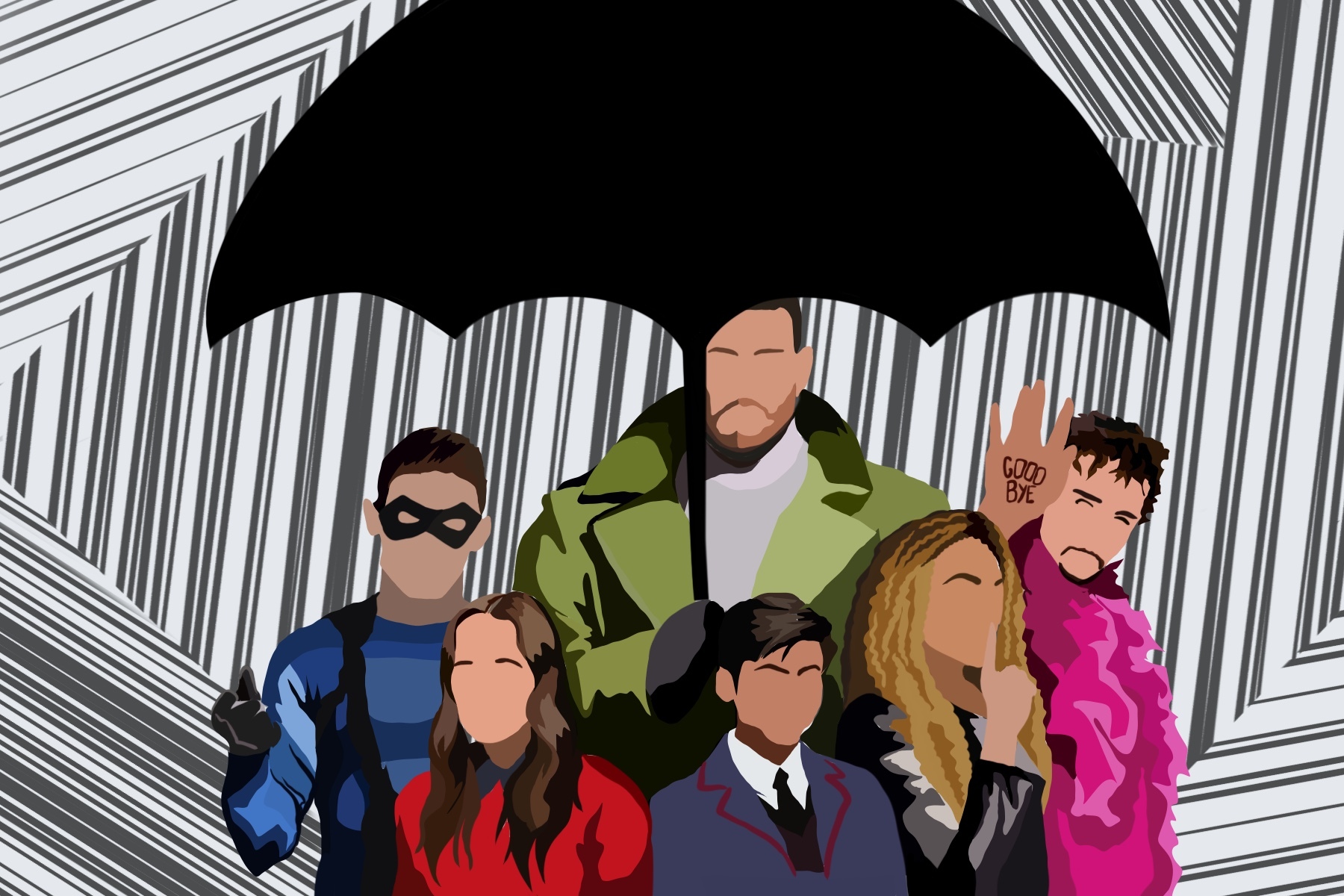“The Umbrella Academy” follows the dysfunctional Hargreeves family as they attempt to stop the apocalypse. The seven superpowered siblings, all born on the same day to mothers who weren’t pregnant when the day began, were adopted by billionaire Reginald Hargreeves (Colm Feore), who named them all with numbers. He trained six of them as superheroes to conduct missions and eventually stop the imminent end of the world, naming their group “The Umbrella Academy.”
Last season, the five living, nonmissing siblings reunited for Reginald’s funeral and were stunned by the return of Five / Number Five (Aidan Gallagher), who disappeared when they were teenagers. Five time-traveled to 2019 and stranded himself there, arriving on the day an apocalyptic event destroyed the world. After living alone for decades, he was recruited by an organization known as the Commission, tasked with protecting the timeline, and became an accomplished assassin before defecting back to 2019, trapped in his teenage body.
As the siblings attempt to discover what causes the apocalypse and fight the Commission, which is hot on Five’s trail, the isolated Vanya / Number Seven (Ellen Page) is revealed to have had powers all along. Reginald suppressed them with drugs for years, even getting Allison / Number Three (Emmy Raver-Lampman) to make Vanya forget.
Vanya is understandably upset and angry, and it leads to her powers, which fluctuate based on her emotions, taking over. Luther / Number One (Tom Hopper), Diego / Number Two (David Castañeda), Klaus / Number Four (Robert Sheehan), Allison and Five all team up to stop her from doing any more damage. They all just barely make it out alive, but not before Vanya blows up the moon, unleashing apocalypse-causing asteroids in the process. Five decides to save them by jumping them all back in time and hoping for the best.
Season 2 picks up here, with Five’s powers backfiring again and stranding the siblings across various points between 1960 and 1963 in the same alley in Dallas, Texas. When Five arrives on Nov. 25, 1963, he discovers his siblings fighting a Soviet invasion ending in a deadly nuclear war. A Time Agent from the Commission takes him back 10 days so he can reunite his siblings and stop the apocalypse. Again.
https://www.youtube.com/watch?v=Me0eoCwLj-A
The overall plot thread is much the same as last time — fight the Commission, discover what’s going on with their father, stop the apocalypse — but with some new twists, ranging from Klaus’ cult to the fate of the other 36 children born on the same day as the Hargreeves. “The Umbrella Academy” maintains its strong pacing, acting and action with no evidence of a sophomore slump; if anything, the new season is an improvement.
My favorite part of the show is what I call “peak sibling representation,” meaning its brilliant showcase of the bond between siblings in all its complexity. Their bond is 10 times stronger and funnier now. The mythology expansions are done in coherent ways, and the cliffhanger in the finale has me anxiously awaiting news on a third season.
Perhaps the best part of the season, though, are the areas where fans asked for changes and the writers delivered. One was the incest between Allison and Luther, who were set up throughout the first season to be the show’s major couple. They’re not biologically related, of course, but it’s still incest if you were raised together, okay?
If the actors had any sort of romantic chemistry, “The Umbrella Academy” might have swayed me, but Hopper and Raver-Lampman did not. Of the moments meant to make me swoon for them, only one landed. Luther spoke to Allison’s estranged daughter on the phone for her after Vanya cut Allison’s throat, and half the words he said to Claire were meant for her mother. It was, admittedly, lovely.
Season 2, however, gives up trying to get us invested in their relationship and provides the divorced Allison with a second husband in Raymond Chestnut (Yusuf Gatewood). He works with Allison as an organizer, staging a sit-in at a local restaurant. Ray takes Allison’s powers and the arrival of her many non-Black brothers mostly in stride. It’s clear the two genuinely love each other, and their chemistry is much stronger.
A second thread “The Umbrella Academy” delivered on was Vanya’s sexuality. The first season hinged on Vanya’s relationship with Leonard Peabody (John Magaro), but even before he was revealed as bad, the chemistry between them fell just as flat as Luther and Allison’s did. From the way she dressed to the isolation from her family, Vanya was always a queer-coded character (Page herself is a prominent LGBTQ figure), and the second season allows her to explore it in a satisfying way.
The breakout character of “The Umbrella Academy” is definitely Klaus. His relationship with Ben / Number Six (Justin H. Min) plays a big role, so when fans asked for more, Min got an upgrade to the main cast. Ben died on an Umbrella Academy mission sometime after Five’s disappearance. Immediately after his funeral, Klaus used his powers of communication with the dead to summon him, and he’s been Klaus’ constant companion ever since, serving as the voice of reason when Klaus goes off the rails.
The other siblings remained unaware of Ben’s presence for much of the first season, until his apparition helped them in the final battle. Season 2 allows Ben to interact with his other siblings for the first time in 16 years, both by possessing Klaus and by his own manifestation. Ben is the major cliffhanger going into a potential third season, so I hope his story will be further explored then.
One thing “The Umbrella Academy” actually buckled down on, though, was playing into anti-Semitic tropes. The Commission is a secret society tasked with preserving the timeline and therefore controlling world events. In the first season, The Handler (Kate Walsh), a Commission agent, speaks Yiddish, and the phrase she speaks is apparently popular at the Commission.
The show was called out then, but The Handler speaks Yiddish again in Season 2, though on a much less obvious scale — she merely uses the term “shvitz” while at a sauna, peppered in amongst her English. I might not have noticed it had I not been looking for it.
Showrunner Steve Blackman, who himself is Jewish, responded to the criticism by saying, “The Handler was not created as an anti-Semitic character,” elaborating that she shows off multiple languages in the second season and reminding critics that the Commission only controls the timeline, not governments or finances, the usual claims of the conspiracy theory.
It is an interesting choice to double down on it regardless, especially considering the documented rise in anti-Semitic incidents in the past year. While both facts about the Handler and the Commission are true, what is shown and said on screen matters. You can play into anti-Semitic tropes without meaning to just as easily as you can sexist, racist or homophobic ones, and just because you did not intend to does not mean you get a free pass.
If you’re looking for a new superhero show, “The Umbrella Academy” is a great option, providing strong storytelling and entertainment value. Both seasons are now available on Netflix.

















